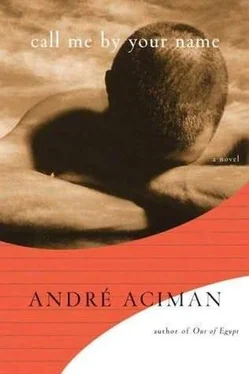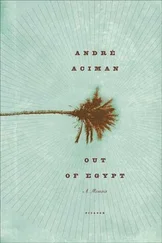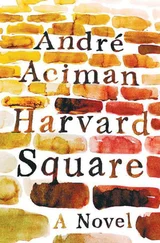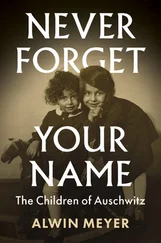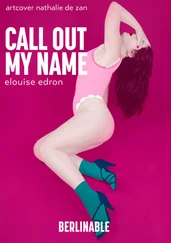André Aciman - Call Me by Your Name
Здесь есть возможность читать онлайн «André Aciman - Call Me by Your Name» весь текст электронной книги совершенно бесплатно (целиком полную версию без сокращений). В некоторых случаях можно слушать аудио, скачать через торрент в формате fb2 и присутствует краткое содержание. Год выпуска: 2007, Издательство: Farrar, Straus and Giroux, Жанр: Современная проза, на английском языке. Описание произведения, (предисловие) а так же отзывы посетителей доступны на портале библиотеки ЛибКат.
- Название:Call Me by Your Name
- Автор:
- Издательство:Farrar, Straus and Giroux
- Жанр:
- Год:2007
- ISBN:нет данных
- Рейтинг книги:5 / 5. Голосов: 6
-
Избранное:Добавить в избранное
- Отзывы:
-
Ваша оценка:
- 100
- 1
- 2
- 3
- 4
- 5
Call Me by Your Name: краткое содержание, описание и аннотация
Предлагаем к чтению аннотацию, описание, краткое содержание или предисловие (зависит от того, что написал сам автор книги «Call Me by Your Name»). Если вы не нашли необходимую информацию о книге — напишите в комментариях, мы постараемся отыскать её.
is clear-eyed, bare-knuckled, and ultimately unforgettable.
Call Me by Your Name — читать онлайн бесплатно полную книгу (весь текст) целиком
Ниже представлен текст книги, разбитый по страницам. Система сохранения места последней прочитанной страницы, позволяет с удобством читать онлайн бесплатно книгу «Call Me by Your Name», без необходимости каждый раз заново искать на чём Вы остановились. Поставьте закладку, и сможете в любой момент перейти на страницу, на которой закончили чтение.
Интервал:
Закладка:
This was not a dessert she was familiar with. But she was going to let me have my way in her kitchen without interfering, as if humoring someone who’d been hurt enough already. The bitch knew. She must have seen the foot. Her eyes followed me every step of the way as if ready to pounce on my knife before I slit my veins with it.
After blending my concoction, I poured it into a large glass, aimed a straw into it as if it were a dart, and proceeded toward the patio. On my way there, I stepped into the living room and took out the large picture book of Monet reproductions. I placed it on a tiny stool by the ladder. I wouldn’t show him the book. I’d just leave it there. He’d know.
On the patio, I saw my mother having tea with two sisters who had come all the way from S. to play bridge. The fourth player was due to arrive any minute.
In the back, from the garage area, I could hear their driver discussing soccer players with Manfredi.
I brought my drink to the far end of the patio, took out a chaise longue, and, facing the long balustrade, tried to enjoy the last half hour of full sun. I liked to sit and watch the waning day spread itself out into pre-dusk light. This was when one went for a late afternoon swim, but it was good to read then as well.
I liked feeling so rested. Maybe the ancients were right: it never hurt to be bled from time to time. If I continued to feel this way, later I might try to play one or two preludes and fugues, maybe a fantasy by Brahms. I swallowed more of the yogurt and put my leg on the chair next to mine.
It took me a while to realize that I was striking a pose.
I wanted him to come back and catch me ever so relaxed. Little did he know what I was planning for tonight.
“Is Oliver around?” I said, turning to my mother.
“Didn’t he go out?”
I didn’t say anything. So much for “I’ll stick around,” then.
In a while, Mafalda came to remove the empty glass. Vuoi un altro di questi , did I want another of these ? she seemed to say as though referring to a strange brew whose foreign, un-Italian name, if it had one, was of no interest to her.
“No, maybe I’ll go out.”
“But where will you go at this time?” she asked, implying dinner. “Especially in the state you were in at lunch. Mi preoccupo , I worry.”
“I’ll be okay.”
“I’d advise against it.”
“Don’t worry.”
“Signora,” she shouted, trying to enlist my mother’s support.
My mother agreed it was a bad idea.
“Then I’ll go for a swim.”
Anything but count the hours until tonight.
On my way down the stairway to the beach, I encountered a group of friends. They were playing volleyball on the sand. Did I want to play? No, thank you, I’ve been sick. I left them alone and ambled toward the large rock, stared at it for a while, and then looked out to the sea, which seemed to aim a rippling shaft of sunlight on the water directly toward me, as in a Monet painting. I stepped into the warm water. I was not unhappy. I wanted to be with someone. But it didn’t trouble me that I was alone.
Vimini, who must have been brought there by one of the others, said she heard I’d been unwell. “We sick ones—,” she began.
“Do you know where Oliver is?” I asked.
“I don’t know. I thought he went fishing with Anchise.”
“With Anchise? He’s crazy! He almost got killed the last time.”
No response. She was looking away from the setting sun.
“You like him, don’t you?”
“Yes,” I said.
“He likes you too — more than you do, I think.”
Was this her impression?
No, it was Oliver’s.
When had he told her?
A while ago.
It corresponded to the time when we had almost stopped speaking to each other. Even my mother had taken me aside that week and suggested I be more polite with our cauboi — all that walking in and out of rooms without even a perfunctory hello, not nice.
“I think he is right,” said Vimini.
I shrugged my shoulders. But I had never been visited by such powerful contradictions before. This was agony, for something like rage was brimming over inside me. I tried to still my mind and think of the sunset before us, the way people about to be given a polygraph like to visualize serene and placid settings to disguise their agitation. But I was also forcing myself to think of other things because I did not want to touch or use up any thoughts bearing on tonight. He might say no, he might even decide to leave our house and, if pressed, explain why. This was as far as I would let myself think.
A horrible thought gripped me. What if, right now, among some of the townsfolk he had befriended, or among all those people who clamored to invite him for dinner, he were to let out, or just hint at, what had happened during our bike ride into town? In his place, would I have been able to keep a lid on such a secret? No.
And yet, he had shown me that what I wanted could be given and taken so naturally that one wonders why it needed such hand-wringing torment and shame, seeing it was no more complicated a gesture than, say, buying a pack of cigarettes, or passing a reefer, or stopping by one of the girls behind the piazzetta late at night and, having settled on a price, going upstairs for a few minutes.
When I returned after swimming, there was still no sign of him. I asked. No, he wasn’t back. His bike was in the same place where we’d left it just before noon. And Anchise had returned hours ago. I went up to my room and from my balcony tried to make my way through the French windows of his room. They were shut. All I saw through the glass was the shorts he had been wearing at lunch.
I tried to remember. He was wearing a bathing suit when he came into my bedroom that afternoon and promised to stick around. I looked out of the balcony hoping to spot the boat, in case he had decided to take it out again. It was moored to our wharf.
When I came downstairs, Father was having cocktails with a reporter from France. Why don’t you play something? he asked. “Non mi va,” I said, “don’t feel like it.” “E perché non ti va?” he asked, as though taking issue with the tone of my words. “Perché non mi va!” I shot back.
Having finally crossed a major barrier this morning, it seemed I could openly express the petty stuff that was on my mind right now.
Perhaps I too should have a drop of wine, said my father.
Mafalda announced dinner.
“Isn’t it too early for dinner?” I asked.
“It’s past eight.”
My mother was escorting one of her friends who had come by car and had to leave.
I was grateful that the Frenchman was sitting on the edge of his armchair, as though on the verge of standing up to be shown to the dining room, yet still sitting down, not budging. He was holding an empty glass in both hands, forcing my father, who had just asked him what he thought of the upcoming opera season, to remain seated while he finished answering him.
Dinner was pushed back by another five to ten minutes. If he was late for dinner, he wouldn’t eat with us. But if he was late that meant he was having dinner elsewhere. I didn’t want him to have dinner anywhere but with us tonight.
“ Noi ci mettiamo a tavola , we’ll sit down,” said my mother. She asked me to sit next to her.
Oliver’s seat was empty. My mother complained that he should at least have let us know he wasn’t coming for dinner.
Father said it might be the boat’s fault again. That boat should be totally dismantled.
But the boat was downstairs, I said.
“Then it must be the translator. Who was it who told me he needed to see the translator this evening?” asked my mother.
Must not show anxiety. Or that I cared. Stay calm. I didn’t want to bleed again. But that moment of what seemed like bliss now when we’d walked our bikes on the piazzetta both before and after our talk belonged to another time segment, as though it had happened to another me in some other life that was not too different from my own, but removed enough to make the few seconds that kept us apart seem like light-years away. If I put my foot on the floor and pretend that his is just behind the leg of the table, will that foot, like a starship that has turned on its cloaking device, like a ghost summoned by the living, suddenly materialize from its dimple in space and say, I know you’ve beckoned. Reach and you’ll find me ?
Читать дальшеИнтервал:
Закладка:
Похожие книги на «Call Me by Your Name»
Представляем Вашему вниманию похожие книги на «Call Me by Your Name» списком для выбора. Мы отобрали схожую по названию и смыслу литературу в надежде предоставить читателям больше вариантов отыскать новые, интересные, ещё непрочитанные произведения.
Обсуждение, отзывы о книге «Call Me by Your Name» и просто собственные мнения читателей. Оставьте ваши комментарии, напишите, что Вы думаете о произведении, его смысле или главных героях. Укажите что конкретно понравилось, а что нет, и почему Вы так считаете.
